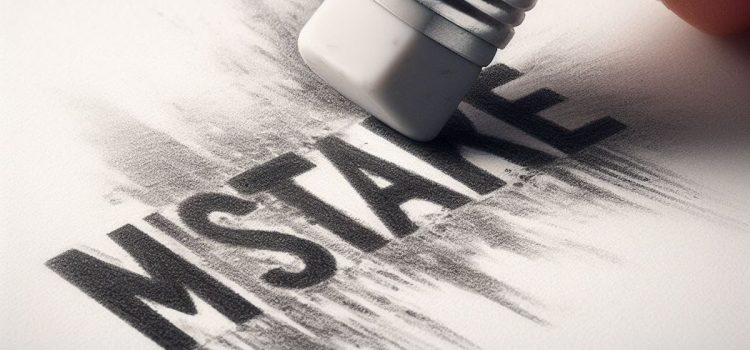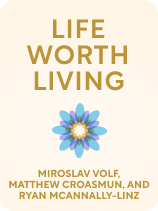

This article is an excerpt from the Shortform book guide to "Life Worth Living" by Miroslav Volf, Matthew Croasmun, and Ryan McAnnally-Linz. Shortform has the world's best summaries and analyses of books you should be reading.
Like this article? Sign up for a free trial here.
When you realize you’ve made a mistake, what’s the first thing you do? How do you make things better?
Yale professors Miroslav Volf, Matthew Croasmun, and Ryan McAnnally-Linz wrote Life Worth Living as a guide to developing your own philosophy of life. But, even when you’re living a worthwhile and virtuous life, you’re bound to mess up. What you do next matters.
Keep reading for some wisdom on how to fix your mistakes and move forward in a positive direction.
How to Fix Your Mistakes
No matter how hard you try to live well, you’re bound to make mistakes. You might not realize you’ve made a mistake until you witness a negative consequence of your actions. The authors’ advice on how to fix your mistakes is to start by accepting responsibility for them. (If you don’t, you’re more likely to repeat the mistake.) Then, you can try to do better in the future.
(Shortform note: In addition to helping you avoid repeating your mistakes, psychologists say that taking responsibility for your mistakes can benefit you in another way: It reinforces your sense of agency—the feeling that you have power over your own actions and circumstances. A heightened sense of agency is linked to higher self-esteem, greater resilience, and improved mental health in general.)
If you lack confidence in your ability to do better, the authors recommend setting bite-sized goals for yourself. Bite-sized goals are doable and realistic, so you’ll be more likely to succeed at them. As you aim for one bite-sized goal after the other, you’ll make gradual progress, which is better than trying (and failing) to leap toward an unreachable goal.
(Shortform note: To set bite-sized goals for self-improvement, consider using what author Brett Blumenthal calls the “52 Small Changes” method. This entails planning 52 small steps you can take over the next year that will help you make progress toward a larger goal. For example, if your larger goal is to become a more empathetic person, you might try volunteering for an hour one week, practicing loving-kindness meditation for an hour the next week, and so on. At the end of the year, the small steps you’ve taken add up to a big leap forward.)
However, Volf, Croasmun, and McAnnally-Linz acknowledge that, sometimes, simply trying to do better in the future isn’t enough. This may be the case if you’ve harmed someone or believe you’ve offended God. In that case, you need to repair the harm you’ve done. One strategy for this is the Jewish and Christian practice of “repentance.” First, openly admit your mistake to the person you harmed, your community, and God. Second, try to mend what you’ve broken; for example, if you stole something, return the item and apologize. Third, change your behavior—if you truly regret your mistake, you won’t make it again.
(Shortform note: In Judaism and other Abrahamic religions, the counterpart to repentance is forgiveness—the choice to resolve and let go of your resentments against those who’ve harmed you. Experts believe that regardless of your religious affiliation, forgiving others has mental and physical health benefits like an improved stress response, enhanced immune health, and strengthened relationships. However, psychologists also explain that forgiveness isn’t always necessary for health and healing—especially in cases where the person who harmed you seems glad that they did and doesn’t express remorse.)
Another strategy for repairing harm comes from the Buddhist thinker Pema Chӧdrӧn. First, allow yourself to feel remorseful. Volf, Croasmun, and McAnnally-Linz emphasize that this doesn’t mean shaming yourself; instead, it refers to a deep acceptance that what you’ve done is wrong. Second, be merciful to yourself by stopping the behavior, therefore ensuring you won’t have to face the negative consequences of this mistake again. Third, give yourself some loving attention in the form of meditation; this will make you strong enough to resist future temptations. Fourth, decide that you won’t ever make this mistake again.
(Shortform note: Chӧdrӧn elaborates on her suggestion to repair harm without shaming yourself, explaining that there’s a big difference between feeling guilty and feeling remorseful. Guilt is egocentric, she says, because when you feel guilty, your focus is on making judgments about your identity and your worth. Remorse, on the other hand, is a form of self-compassion: You feel and express sorrow on behalf of previous versions of yourself, since past you wasn’t capable of making a wiser choice. Chӧdrӧn also says that it’s healthier to embrace remorseful sorrow than to indulge in egocentric guilt because sorrow helps you grow psychologically.)

———End of Preview———
Like what you just read? Read the rest of the world's best book summary and analysis of Miroslav Volf, Matthew Croasmun, and Ryan McAnnally-Linz's "Life Worth Living" at Shortform.
Here's what you'll find in our full Life Worth Living summary:
- What a life philosophy is and why you should have one
- The four key components of a good life philosophy
- Why contemplating death can motivate you to live more fully






